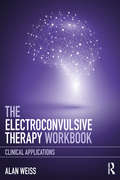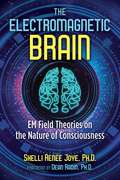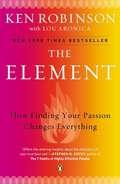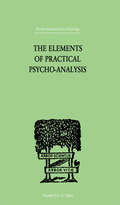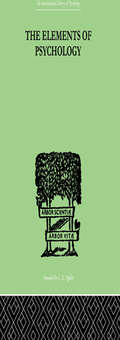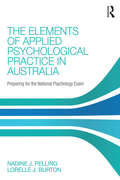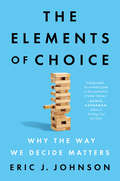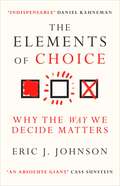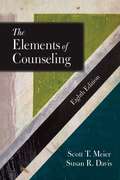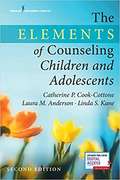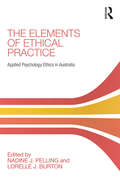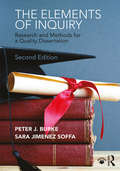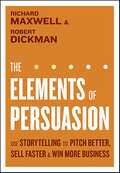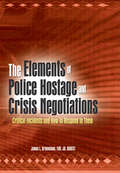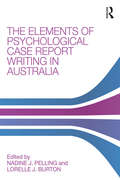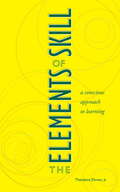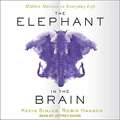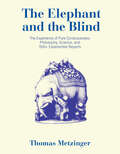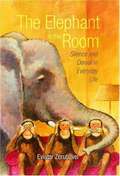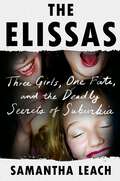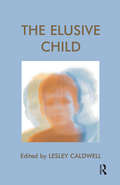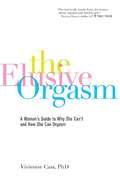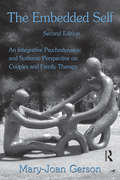- Table View
- List View
The Electroconvulsive Therapy Workbook: Clinical Applications
by Alan WeissElectroconvulsive Therapy (ECT) remains one of the most effective forms of neurostimulation for severe mental illness. Sound scientific research underpins contemporary practice challenging the complex history and stigma that surround this treatment. The Electroconvulsive Therapy Workbook integrates the history of ECT with major advances in practice, including ultrabrief ECT, in a hands-on workbook format. Novel forms of neurostimulation are reviewed, highlighting the future directions of practice in this exciting area. The book is also richly illustrated with historical and technical images and includes ‘clinical wisdom’ sections that provide the reader with clinical insights into ECT practice. Online eResources are also available, featuring a wide range of questions and answers related to each chapter to help test and consolidate readers’ understanding of ECT, as well as regionally specific legislation governing ECT practice in Australia and New Zealand. This comprehensive introduction to ECT is a must-read for doctors in training, psychiatrists who require credentialing in this procedure, anaesthetists, nursing staff who work in ECT and other professionals who have an interest in ECT as well as consumer and carer networks.
The Electromagnetic Brain: EM Field Theories on the Nature of Consciousness
by Shelli Renée JoyeAn exploration of cutting-edge theories on the electromagnetic basis of consciousness • Details, in nontechnical terms, 12 credible theories, each published by prominent professionals with extensive scientific credentials, that describe how electromagnetic fields may be the basis for consciousness • Examines practical applications of electromagnetic-consciousness theory, including the use of contemporary brain stimulation devices to modify and enhance consciousness • Explores the work of William Köhler, Susan Pockett, Johnjoe McFadden, Rupert Sheldrake, Ervin Laszlo, William Tiller, Harold Saxton Burr, Sir Roger Penrose, Stuart Hameroff, Mari Jibu, Kunio Yasue, Karl Pribram, Alfred North Whitehead, and James Clerk Maxwell, as well as the author's own theories In this scientific exploration of the origin of consciousness, Shelli Renée Joye, Ph.D., explores 12 credible theories, each published by prominent professionals with extensive scientific credentials, that describe how electricity in the form of electromagnetic fields is the living consciousness that runs through the brain. Each of these theories supports the idea that the electromagnetic field itself is the basis of consciousness and that this source of consciousness peers out into the space-time universe through our human sensory systems, flowing with awareness throughout the bloodstream and nervous system. Following her exploration of electromagnetic-consciousness theories, Joye then examines practical applications, describing how electric fields might be manipulated and controlled to modify and enhance the operation of consciousness in the human brain. She explores the use of contemporary brain stimulation devices that offer benefits such as decreased addiction cravings and anxiety, reduced depression and chronic pain, enhanced mathematical abilities, accelerated learning, and greater insight during mindfulness meditation. Revealing the cutting edge of consciousness studies, Joye shows that consciousness is not an isolated function of the individual brain but is connected to the larger electromagnetic field that not only encompasses the entire physical universe but also is deeply involved in the creation of matter and the material world.
The Element: How Finding Your Passion Changes Everything
by Lou Aronica Ken RobinsonA breakthrough book about talent, passion, and achievement from one of the world's leading thinkers on creativity and self-fulfillment. The Element is the point at which natural talent meets personal passion. When people arrive at the Element, they feel most themselves and most inspired and achieve at their highest levels. With a wry sense of humor, Ken Robinson looks at the conditions that enable us to find ourselves in the Element and those that stifle that possibility. Drawing on the stories of a wide range of people, including Paul McCartney, Matt Groening, Richard Branson, Arianna Huffington, and Bart Conner, he shows that age and occupation are no barrier and that this is the essential strategy for transforming education, business, and communities in the twenty-first century.
The Elementary School Counselor’s Guide to Supporting Students with Learning Disabilities: A Comprehensive Program
by Mati SichererThis unique book informs elementary school counselor practice in a positive way that changes the lives of students with learning disabilities by helping to engage them in their learning in an effective and concrete manner. Through a comprehensive lens, this book gives elementary school counselors the tools they need to work with students with learning disabilities in a school setting, starting with an overview of learning disabilities as they apply to the role of the elementary school counselor. The second part of the book then explores these topics in depth with a step-by-step program for creating counselor-led groups for elementary school students with learning disabilities. The 6-to-8-week plan outlines how elementary school counselors can create and implement the program in their own schools and is accompanied by worksheets and handouts to help engage students. Exceptionally beneficial for elementary school counselors and graduate students in school counseling programs, it is a guide book for counselors working with elementary school students with learning disabilities.
The Elements Of Practical Psycho-Analysis
by Bousfield, PaulFirst Published in 1999. Routledge is an imprint of Taylor & Francis, an informa company.
The Elements Of Psychology
by Thorndike, Edward LFirst Published in 1999. Routledge is an imprint of Taylor & Francis, an informa company.
The Elements of Applied Psychological Practice in Australia: Preparing for the National Psychology Examination
by Nadine Pelling Lorelle BurtonThe Elements of Applied Psychological Practice in Australia is a comprehensive and applied review of material required for basic psychological practice in Australia. This book is the first of its kind to offer a one-step resource to success in the Australian National Psychology Examination. Nadine Pelling and Lorelle Burton have provided you with everything you need and more, most notably: • A comprehensive review of applied areas and all assessments noted as important by the Psychology Board of Australia • Study skills and tips, including ‘making a study plan’ and how to manage your time • 100 sample Multiple Choice Questions (MCQ) with answers and explanations. For anyone looking to take the Australian National Psychology Examination, this detailed, concise, and extremely easy to read book is an absolute must-have. Beginning-level and experienced psychologists will also find the comprehensive coverage of applied practice areas a useful reference for their client-related work, and its value as a resource comes alive with its succinct presentation of client-based psychological assessment and the ethics of applied practice and interventions. This book will also be of interest to teachers of psychology and international psychologists and scholars who may be interested in how psychology is practiced in Australia.
The Elements of Choice: Why the Way We Decide Matters
by Eric J. JohnsonA leader in decision-making research reveals how choices are designed—and why it&’s so important to understand their inner workingsEvery time we make a choice, our minds go through an elaborate process most of us never even notice. We&’re influenced by subtle aspects of the way the choice is presented that often make the difference between a good decision and a bad one. How do we overcome the common faults in our decision-making and enable better choices in any situation? The answer lies in more conscious and intentional decision design.Going well beyond the familiar concepts of nudges and defaults, The Elements of Choice offers a comprehensive, systematic guide to creating effective choice architectures, the environments in which we make decisions. The designers of decisions need to consider all the elements involved in presenting a choice: how many options to offer, how to present those options, how to account for our natural cognitive shortcuts, and much more. These levers are unappreciated and we&’re often unaware of just how much they influence our reasoning every day.Eric J. Johnson is the lead researcher behind some of the most well-known and cited research on decision-making. He draws on his original studies and extensive work in business and public policy and synthesizes the latest research in the field to reveal how the structure of choices affects outcomes. We are all choice architects, for ourselves and for others. Whether you&’re helping students choose the right school, helping patients pick the best health insurance plan, or deciding how to invest for your own retirement, this book provides the tools you need to guide anyone to the decision that&’s right for them.
The Elements of Choice: Why the Way We Decide Matters
by Eric J. Johnson&‘Indispensable&’ Daniel Kahneman How do you get people to donate their organs? What&’s the trick to reading a wine list? What&’s the perfect number of potential matches a dating site should offer? Every time we make a choice, our minds go through an elaborate process most of us never even notice. We&’re influenced by subtle aspects of the way the choice is presented that often make the difference between a good decision and a bad one. To overcome the common faults in our decision-making and enable better choices in any situation involves conscious and intentional decision design. Transcending the familiar concepts of nudges and defaults, The Elements of Choice offers a comprehensive, systematic guide to creating effective choice architectures, the environments in which we make decisions. The designers of decisions need to consider all the elements involved in presenting a choice: how many options to offer, how to present those options, how to account for our natural cognitive shortcuts, and much more. These levers are unappreciated, yet they impact our reasoning every day. This book doesn&’t simply analyse the mental fallacies that trip us up. It goes further to show us what good decision-making looks like – that it can be both moral and effective.
The Elements of Counseling
by Susan Davis Scott MeierThe Elements of Counseling distills the basic elements of counseling what it is and what it is not in a highly accessible outline format. Meier and Davis present essential information for both beginning and experienced counselors and include valuable counselor-client dialogues to demonstrate skill application in real-world scenarios. The latest edition is enhanced with updates on emotional avoidance, Acceptance and Commitment Therapy, Motivational Interviewing, personalized interventions, progress monitoring and outcome assessment, and Barlow's Unified Protocol. Simple, clear, and practical, this popular primer establishes a conceptual framework on which students of all helping professions can establish and build their counseling knowledge.
The Elements of Counseling (Seventh Edition)
by Scott T. Meier Susan R. DavisMaster the qualities of a skilled therapist with THE ELEMENTS OF COUNSELING. Brief and practical, this handy guide focuses on relationship building, the counseling process, self-exploration, and presents information that is essential for beginning counselors to know and for experienced counselors to remember. Designed to give you immediate access to information without having to read pages of commentary, this counseling textbook serves as a quick reference for both counselors in training and practitioners.
The Elements of Counseling Children and Adolescents
by Catherine P. Cook-Cottone Laura M. Anderson Linda S. KaneThis unique, user-friendly text distills essential and up-to-date guidelines for students and practitioners of child and adolescent counseling. Featuring concise, step-by-step protocols supported by evidence-based practice, the book is organized in a logical sequence, from setting the stage for the counseling process to the essentials of active counseling. The second edition is distinguished by a more holistic approach to counseling that focuses on the client’s narrative, goal-setting as a partnership between counselor and client, and heightened sensitivity to all forms of diversity. This includes new content about LBTQIA clients and those suffering from trauma or substance abuse. <p><p> The second edition focuses on strategies for fostering growth and self-inquiry and presents new information on teaching tools for stress tolerance, negotiating social conflict, and the importance of monitoring progress. Key concepts such as using developmentally appropriate language and activities are addressed, and as are critical issues such as collaborating with parents and other professionals, responding to crisis situations, and counselor self-awareness and self-care. Case examples of client/counselor dialogues along with summary and questions at the end of each chapter illustrate foundational concepts and facilitate critical thinking. An instructor manual is also included.
The Elements of Ethical Practice: Applied Psychology Ethics in Australia
by Lorelle J. Burton Nadine J. PellingThe Elements of Ethical Dilemmas: Applied Psychology Ethics in Australia is a comprehensive and applied guide to practising psychology in an ethical and professional manner. This book is designed to assist applicants for general registration as a psychologist successfully navigate one of the eight core competencies for general registration set by the Psychology Board of Australia; specifically ethical, legal, and professional matters. The exploration of ethical dilemmas is a core task for the 4+2 pathway to general registration, while related ethical applications require exploration in the 5+1 and higher education pathways to registration as well. This book will teach readers how to identify, explore, and choose the appropriate professional course of action when confronted by ethical dilemmas in practice. The chapters include personal reflections from expert contributors relating to each of the ethical dilemmas, expertly highlighting clients’ and stakeholders’ circumstances, ethical codes and guidelines, scholarship and research, as well as other key elements in the ethical decision-making process. Especially relevant to those applying to become a registered psychologist in Australia, this book offers invaluable guidance on responding to ethical dilemmas as required by the Psychology Board of Australia in various pathways to general registration.
The Elements of Inquiry: Research and Methods for a Quality Dissertation
by Peter J. Burke Sara Jimenez SoffaThe Elements of Inquiry covers the basic guidelines for graduate students doing an investigation or inquiry project. It distils the rubrics necessary for teaching research methods and completing research projects, and gives the student researcher a list of steps to follow to complete any type of inquiry project – including formal research projects such as doctoral dissertations. It was written to support the work of students in an educational leadership doctoral program, but it will also assist the research efforts of college students at any level in any discipline. The book begins by establishing the underlying philosophical concepts upon which all good research is based, preparing students to get down to the "nuts and bolts" of conducting their own research and evaluating the research of others. Fundamental concepts and rules of research are explained both for producers and consumers of social science and educational research. Numerous practical examples illustrate the steps in the research process presented in the text. There are end-of-chapter exercises for students to apply the concepts discussed in the chapter. Templates for organizing and presenting research provide students with a game plan for success with their research. The book ends with an up-to-date annotated bibliography of beginning and advanced research texts allowing students easy access to books that detail the more specialized research topics. While most research books detail one or more method in depth, this text provides a broad introduction to many techniques and models used in doctoral dissertations, and will be of particular value to those who are consumers of inquiry studies and research reports. Key to the overview provided is the annotated bibliography that leads the reader to the next stage of understanding or doing research.
The Elements of Persuasion: Use Storytelling to Pitch Better, Sell Faster & Win More Business
by Richard Maxwell Robert Dickman"Every great leader is a great storyteller," says Harvard University psychologist Howard Gardner. According to master storytellers Richard Maxwell and Robert Dickman, storytelling is a lot like running. Everyone knows how to do it, but few of us ever break the four-minute mile. What separates the great runners from the rest? The greats know not only how to hit every stride, but how every muscle fits together in that stride so that no effort is wasted and their goals are achieved. World-class runners know how to run from the inside out. World-class leaders know how to tell a story from the inside out. In The Elements of Persuasion, Maxwell and Dickman teach you how to tell stories too. They show you how storytelling relates to every industry and how anyone can benefit from its power. Maxwell and Dickman use their experiences—both in the entertainment industry and as corporate consultants—to deliver a formula for winning stories. All successful stories have five basic components: the passion with which the story is told, a hero who leads us through the story and allows us to see it through his or her eyes, an antagonist or obstacle that the hero must overcome, a moment of awareness that allows the hero to prevail, and the transformation in the hero and in the world that naturally results.Let's face it: leading is a lot more fun than following. Even if you never want to be a CEO or to change the world, you do want to have control over your own work and your own ideas. Ultimately, that is what the power of storytelling can give you.
The Elements of Police Hostage and Crisis Negotiations: Critical Incidents and How to Respond to Them
by James L GreenstoneRun a safe and successful crisis negotiation-from start to finish! The Elements of Police Hostage and Crisis Negotiations: Critical Incidents and How to Respond to Them reduces the negotiation procedures for hostage, barricaded, and suicide incidents to their basic elements, providing quick and easy access to the information you need-from the initial call-out to the final debriefing. Based on field-tested principles proven to work, the book also includes newly developed and highly specialized techniques for more experienced negotiators. Author James L. Greenstone provides a user-friendly, step-by-step guide to the intervention and negotiation process that will help you get the job done-right. Designed for day-to-day, on-the-scene use, The Elements of Police Hostage and Crisis Negotiations is a practical handbook for experienced professionals and novices that can also be used as a supplementary textbook for criminal justice, crisis intervention, and psychology coursework. Each chapter contains useful checklists, procedural notes, tables, strategy worksheets, and forms, and the book includes special indices for quick reference in addition to a traditional index. Dr. Greenstone, a police mental health consultant and psychologist who served as Director of the Psychological Services Unit of the Fort Worth Police Department in Texas, uses a simple and direct format that emphasizes procedures, action and results, leaving theoretical discussions for another time and place. The book examines the negotiation process from start to finish, including preincident preparations, first response responsibilities, responding to the call-out, arriving at the scene, preparing to negotiate, making contact, preparing for the surrender, post-incident tasks, preparing equipment, and more. Topics covered in The Elements of Police Hostage and Crisis Negotiations include: legal considerations telephone surveillance guidelines the Stockholm Syndrome working with S.W.A.T. and Tactical Emergency Medical Support dealing with the media recognizing "red flags" the issues of suicide debriefing the hostage team the 150 laws of hostage and crisis negotiation and the 10 most serious errors a negotiator can make The Elements of Police Hostage and Crisis Negotiations: Critical Incidents and How to Respond to Them is a practical guide that&’s equally effective in the field, in training, and in the office.
The Elements of Psychological Case Report Writing in Australia
by Lorelle J. Burton Nadine J. PellingThe Elements of Psychological Case Report Writing in Australia is a comprehensive and applied review of material required for basic case conceptualisation and report writing in Australia. This book is the first of its kind to offer a one-step resource to success in submitting concise case reports that demonstrate basic applied psychological competence. For anyone looking to submit case reports to the Psychology Board of Australia to support their application for general registration this is an absolute must-have resource. <P><P>Most notably this book provides: <P><P>Numerous assessment focused and intervention focused case report examples: <P><P>A presentation of case report requirements for 4+2 and 5+1 internship programs; <P><P>A review of important case conceptualisation areas necessary for applied psychological understanding; <P><P>Time management tips and guidance for making focused progress on the production of required case report and avoiding procrastination. <P><P>Both early career and experienced psychologists will find the case reports illustrative of various assessments and interventions in applied psychology in Australia. No other resource has collected together in one place multiple case reports illustrating the use of so many assessment instruments nor such a variety of interventions for the treatment of psychological difficulties in Australia.
The Elements of Skill
by Larry A. Hickman Theodore DimonWhy do so many beginners, both children and adults, fail to master chosen skills? The Elements of Skill was inspired by--and addresses--that question with a program based on proven techniques. The book, written by a renowned practitioner of the Alexander Technique, outlines an educational system that makes the process of learning a performance or athletic skill more conscious, and therefore more successful. Its principles include breaking down a skill into manageable parts, setting realistic goals, observing mind/body processes, overcoming blocks, controlling habits, and achieving heightened awareness and self-mastery. Included are inspiring examples of people who have benefited from the method.
The Elephant In The Brain: Hidden Motives In Everyday Life
by Kevin Simler Robin HansonHuman beings are primates, and primates are political animals. Our brains, therefore, are designed not just to hunt and gather but also to help us get ahead socially, often via deception and self-deception. But while we may be self-interested schemers, we benefit by pretending otherwise. The less we know about our own ugly motives, the better - and thus, we don't like to talk, or even think, about the extent of our selfishness. This is "the elephant in the brain". <p><p> Such an introspective taboo makes it hard for us to think clearly about our nature and the explanations for our behavior. The aim of this book, then, is to confront our hidden motives directly - to track down the darker, unexamined corners of our psyches and blast them with floodlights. Then, once everything is clearly visible, we can work to better understand ourselves: Why do we laugh? Why are artists sexy? Why do we brag about travel? Why do we prefer to speak rather than listen? <p> Our unconscious motives drive more than just our private behavior; they also infect our venerated social institutions such as art, school, charity, medicine, politics, and religion. In fact, these institutions are in many ways designed to accommodate our hidden motives, to serve covert agendas alongside their "official" ones. The existence of big hidden motives can upend the usual political debates, leading one to question the legitimacy of these social institutions, and of standard policies designed to favor or discourage them.
The Elephant and the Blind: The Experience of Pure Consciousness: Philosophy, Science, and 500+ Experiential Reports
by Thomas MetzingerAn engaging and insightful journey into human consciousness.What if our goal had not been to land on Mars, but in pure consciousness? The experience of pure consciousness—what does it look like? What is the essence of human consciousness? In The Elephant and the Blind, influential philosopher Thomas Metzinger, one of the world's leading researchers on consciousness, brings together more than 500 experiential reports to offer the world's first comprehensive account of states of pure consciousness. Drawing on a large psychometric study of meditators in 57 countries, Metzinger focuses on &“pure awareness&” in meditation—the simplest form of experience there is—to illuminate the most fundamental aspects of how consciousness, the brain, and illusions of self all interact.Starting with an exploration of existential ease and ending on Bewusstseinskultur, a culture of consciousness, Metzinger explores the increasingly non-egoic experiences of silence, wakefulness, and clarity, of bodiless body-experience, ego-dissolution, and nondual awareness. From there, he assembles a big picture—the elephant in the parable, from which the book&’s title comes—of what it would take to arrive at a minimal model explanation for conscious experience and create a genuine culture of consciousness. Freeing pure awareness from new-age gurus and old religions, The Elephant and the Blind combines personal reports of pure consciousness with incisive analysis to address the whole consciousness community, from neuroscientists to artists, and its accessibility echoes the author&’s career-long commitment to widening access to philosophy itself.
The Elephant in the Room: Silence and Denial in Everyday Life
by Eviatar ZerubavelThe fable of the Emperor's New Clothes is a classic example of a conspiracy of silence, a situation where everyone refuses to acknowledge an obvious truth. But the denial of social realities--whether incest, alcoholism, corruption, or even genocide-is no fairy tale. In The Elephant in the Room, Eviatar Zerubavel sheds new light on the social and political underpinnings of silence and denial--the keeping of "open secrets." The author shows that conspiracies of silence exist at every level of society, ranging from small groups to large corporations, from personal friendships to politics. Zerubavel shows how such conspiracies evolve, illuminating the social pressures that cause people to deny what is right before their eyes. We see how each conspirator's denial is symbiotically complemented by the others', and we learn that silence is usually more intense when there are more people conspiring--and especially when there are significant power differences among them. He concludes by showing that the longer we ignore "elephants," the larger they loom in our minds, as each avoidance triggers an even greater spiral of denial. Drawing on examples from newspapers and comedy shows to novels, children's stories, and film, the book travels back and forth across different levels of social life, and from everyday moments to large-scale historical events. At its core, The Elephant in the Room helps us understand why we ignore truths that are known to all of us. "Eviatar Zerubavel gathers intriguing ideas for books the way ace foreign correspondents acquire great stories: by reflecting on the obvious, then probing as well as reporting."--The Philadelphia Inquirer
The Elissas: Three Girls, One Fate, and the Deadly Secrets of Suburbia
by Samantha LeachAmazon's Best Nonfiction Book of the Month for June 2023Nylon's "June 2023's Must-Read Book Releases"Pure Wow&’s &“11 Books We Can&’t Wait to Read in June&”The Skimm&’s &“17 of Our Favorite Books Coming Out This Summer&”Glamour&’s &“15 Best Nonfiction Books of 2023, So Far&”Bustle&’s &“Most Anticipated Books Of Spring & Summer 2023&”Harper&’s Bazaar&’s &“23 Best Summer Beach Reads of 2023&”Zibby Mag&’s &“Most Anticipated Spring and Summer Books&” A New York Post Best Books of the Week selectionThree suburban girls meet at a boarding school for troubled teens.Eight years later, they were dead.Bustle editor Samantha Leach and her childhood best friend, Elissa, met as infants in the suburbs of Providence, Rhode Island, where they attended nursery, elementary school, and temple together. As seventh graders, they would steal drinks from bar mitzvahs and have boys over in Samantha&’s basement—innocent, early acts of rebellion. But after one of their shared acts, Samantha was given a disciplinary warning by their private school while Elissa was dismissed altogether, and later sent away. Samantha did not know then, but Elissa had just become one of the fifty-thousand-plus kids per year who enter the Troubled Teen Industry: a network of unregulated programs meant to reform wealthy, wayward youth. Less than a year after graduation from Ponca Pines Academy, Elissa died at eighteen years old. In Samantha&’s grief, she fixated on Elissa&’s last years at the therapeutic boarding school, eager to understand why their paths diverged. As she spoke to mutual friends and scoured social media pages, Samantha learned of Alyssa and Alissa, Elissa&’s closest friends at the school who shared both her name and penchant for partying, where drugs and alcohol became their norm. The matching Save Our Souls tattoo all three girls also had further fueled Samantha&’s fixation, as she watched their lives play out online. Four years after Elissa&’s death, Alyssa died, then Alissa at twenty-six. In The Elissas, Samantha endeavors to understand why they ultimately met a shared, tragic fate that she was spared, in turn, offering a chilling account of the secret lives of young suburban women.
The Elusive Child (The Winnicott Studies Monograph Series)
by Lesley Caldwell'Fuelled by agitation and panic about paedophilia, child abuse, violence and neglect on the one side, and by children as violent murderers and killers on the other, there has been an explosion of concern regarding the place, care, treatment and life of Children, in Europe and beyond. This broad-ranging and provocative collection of papers, a volume in the Winnicott Studies Monograph Series, focuses on all factors pertaining to the child and childhood, including the role that psychoanalysis has to play. The book offers a unique and fascinating understanding of developmental issues from early infancy through latency and into adolescence from various psychoanalytic approaches. The papers, written by experts in the field examine closely all aspects of this fascinating subject from Freud to Winnnicott; from neo-natal care to adolescence. The contributors take into account issues such as fostering and adoption, vital scrutiny of the role of the family, and presentation of children in the media while all the time asking the salient question, "What is a child?"
The Elusive Orgasm: A Woman's Guide to Why She Can't and How She Can Orgasm
by Vivienne CassAre you one of the thirty percent of women who has difficulties with orgasm? Do you want to experience greater sexual satisfaction? In easy to read language, The Elusive Orgasm provides a full overview of women's sexual pleasure, covering sexual triggers, stages of arousal, the power of mind, and how women differ from men. Longtime clinical psychologist and sex therapist Dr. Vivienne Cass reveals all the causes of women's orgasm difficulties - and how to remedy them. In The Elusive Orgasm, you'll learn: What an orgasm is How the clitoris is much more than "a little button" The stages of a woman's arousal The five types of orgasm difficulties The twenty-five causes of those difficulties Self-awareness via quizzes and questionnaires Sexual and non-sexual changes to help you orgasm Step-by-step plans to help you and your partner An extraordinarily thorough, all-inclusive exploration of every possible reason why women have orgasm challenges, The Elusive Orgasm gives you the tools to discover the source of your own orgasm difficulties, along with straightforward remedies.
The Embedded Self: An Integrative Psychodynamic and Systemic Perspective on Couples and Family Therapy
by Mary-Joan GersonFirst published in 1996, The Embedded Self was lauded as "a brilliant and long overdue rapprochement between psychoanalysis and family therapy conceived by a practitioner trained and experienced in both modalities of treatment." Mary-Joan Gerson’s integrated presentation of psychodynamic and family systems theory invited therapists of either orientation to learn the tools and techniques of the other, to mutual benefit. Firmly grounded in detailed case presentations, her focus on family therapy examined its history, organizing concepts, and developmental approaches, and addressed practical questions of diagnosis, clinical interaction, and referrals. A dozen years later, the psychoanalytic community is more open to integrating perspectives, and the growth of analysts working with couples and families necessitates an update of the material presented in The Embedded Self. Similarly, the family therapy community has deepened its interest in individual dynamics within systemic patterning. From a new and revised perspective on the possibilities of integration, Gerson covers the latest research in neuroscience and the transmission of affect within intimate relationships, with a new chapter on attachment theory and emotionally focused therapy. Sections on narrative therapy and psychoanalytically-oriented family therapy are expanded as well. The Embedded Self was a sterling introduction to family systems theory and therapy, and enhanced the work of analysts and family and couples therapists alike. The second edition proves no different in its context but wider in its scope, further enhancing the work of the family therapist interested in individual dynamics, and preparing the psychodynamically-oriented therapist who seeks to extend her craft from the dyad to the triad, and beyond.
